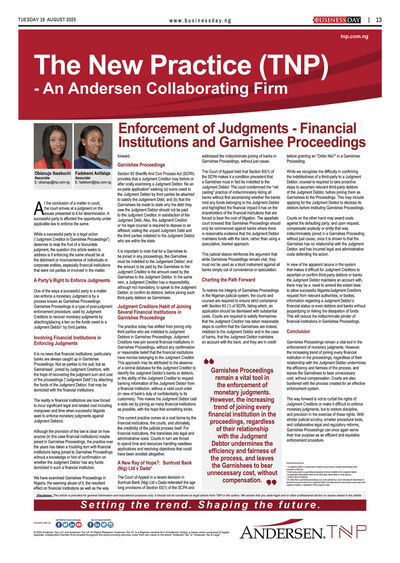At the conclusion of a matter in court, the court arrives at a judgment on the issues presented to it for determination. A successful party is afforded the opportunity under applicable law to enforce the same.
While a successful party to a legal action ("Judgment Creditor in Garnishee Proceedings") deserves to reap the fruit of a favourable judgment, the question this article seeks to address is if enforcing the same should be at the detriment or inconvenience of individuals or corporate entities, especially financial institutions that were not parties or involved in the matter.
A Party's Right to Enforce Judgments
One of the ways a successful party in a matter can enforce a monetary Judgment is by a process known as Garnishee Proceedings.
Garnishee Proceedings is a type of post-judgment enforcement procedure, used by Judgment Creditors to recover monetary judgments by attaching/placing a lien on the funds owed to a Judgment Debtor by third parties.
Involving Financial Institutions in Enforcing Judgments
It is no news that financial institutions, particularly banks are always caught up in Garnishee Proceedings. Not as parties to the suit, but as Garnishees2, joined by Judgment Creditors, with the hope of recovering the judgment sum and cost of the proceedings ("Judgment Debt") by attaching the funds of the Judgment Debtor, that may be domiciled with the financial institutions.
The reality is financial institutions are now forced to incur significant legal and related cost including manpower and lime when successful litigants seek to enforce monetary judgments against Judgment Debtors.
Although the provision of the law is clear on how anyone (in this case financial institutions) maybe joined in Garnishee Proceedings, the practice over the years has taken a troubling turn with financial institutions being joined to Garnishee Proceedings without a knowledge or hint of confirmation on whether the Judgment Debtor has any funds domiciled in such a financial institution.
We have examined Garnishee Proceedings in Nigeria, the seeming abuse of it, the resultant effect on financial institutions as well as the way forward.
Garnishee Proceedings
Section 83 Sheriffs And Civil Process Act (SCPA) provides that a Judgment Creditor may before or after orally examining a Judgment Debtor, file an ex-parte application3 seeking (a) sums owed to the Judgment Debtor by third parties be attached to satisfy the Judgement Debt, and (b) that the Garnishees be made to state why the debt they owe the Judgment Debtor should not be paid to the Judgment Creditor, in satisfaction of the Judgment Debt. Also, the Judgment Creditor or his legal counsel is required to depose to an affidavit, stating the unpaid Judgment Debt and the third parties indebted to the Judgment Debtor who are within the state.
It is important to note that for a Garnishee to be joined in any proceedings, the Garnishee must be indebted to the Judgement Debtor, and the amount to be paid by the Garnishee to the Judgment Creditor is the amount owed by the Garnishee to the Judgment Debtor. In the same vein, a Judgment Creditor has a responsibility, although not mandatory, to speak to the Judgment Debtor, to confirm its debtors, before joining such third-party debtors as Garnishees.
Judgment Creditors' Habit of Joining Several Financial Institutions in Garnishee Proceedings
The practice today has shifted from joining only third parties who are indebted to Judgment Debtors in Garnishee Proceedings. Judgment Creditors now join several financial institutions in Garnishee Proceedings, without any confirmation or reasonable belief that the financial institutions have monies belonging to the Judgment Creditor. This approach may be attributed to the absence of a central database for the Judgment Creditor to identify the Judgment Debtor's banks or debtors, or the ability of the Judgment Creditor to request banking information of the Judgment Debtor from a financial institution, without a valid court order (in view of bank's duty of confidentiality to its customers). This makes the Judgment Debtor cast a wide net by joining as many financial institutions as possible, with the hope that something sticks.
This current practice comes at a cost borne by the financial institutions, the courts, and ultimately, the credibility of the judicial process itself. For financial institutions, this translates into legal and administrative costs. Courts in turn are forced to spend time and resources handling needless applications and resolving objections that could have been avoided altogether.
A New Ray of Hope?: Suntrust Bank (Nig) Ltd V Dada
The Court of Appeal in a recent decision in Suntrust Bank (Nig) Ltd v Dada reiterated the age-long provisions of Section 83(1) of the SCPA and addressed the indiscriminate joining of banks in Garnishee Proceedings, without just cause
The Court of Appeal held that Section 83(1) of the SCPA makes it a condition precedent that a Garnishee must in fact be indebted to the Judgment Debtor. The court condemned the "net casting" practice of indiscriminately listing all banks without first ascertaining whether the banks hold any funds belonging to the Judgment Debtor and highlighted the financial impact ii has on the shareholders of the financial institutions that are forced to bear the cost of litigation. The appellate court stressed that Garnishee Proceedings should only be commenced against banks where there is reasonable evidence that the Judgment Debtor maintains funds with the bank, rather than using a speculative, blanket approach.
This judicial stance reinforces the argument that while Garnishee Proceedings remain vital, they must not be used as a blunt instrument against all banks simply out of convenience or speculation.
Charting the Path Forward
To restore the integrity of Garnishee Proceedings in the Nigerian judicial system, the courts and counsel are required to ensure strict compliance with Section 83 (1) of SCPA, failing which, an application should be dismissed with substantial costs. Courts are required to satisfy themselves that the Judgment Creditor has taken reasonable steps to confinm that the Garnishees are indeed, indebted to the Judgment Debtor and in the case of banks, that the Judgment Debtor maintains an account with the bank, and they are in credit before granting an "order Nisi" in a Garnishee Proceeding.
While we recognise the difficulty in confirming the indebtedness of a third-party to a Judgment Debtor, counsel is required to take proactive steps to ascertain relevant third-party debtors of the Judgment Debtor, before joining them as Garnishees to the Proceedings. This may include applying for the Judgment Debtor to disclose its debtors before instituting Garnishee Proceedings.
Courts on the other hand may award costs against the defaulting party, and upon request, compensate anybody or entity that was indiscriminately joined in a Garnishee Proceeding without just cause, once it is shown to that the Garnishee has no relationship with the Judgment Debtor, and has incurred legal and administrative costs defending the action.
In view of the apparent lacuna in the system that makes it difficult for Judgment Creditors to ascertain or confirm third-party debtors or banks the Judgment Debtor maintains an account with, there may be a need to amend the extant laws to allow successful litigants/Judgment Creditors request from relevant authorities, or bodies, information regarding a Judgment Debtor's financial status or even debtors and banks without jeopardizing or risking the dissipation of funds. This will reduce the indiscriminate joinder of financial institutions in Garnishee Proceedings.
Conclusion
Garnishee Proceedings remain a vital tool in the enforcement of monetary judgments. However, the increasing trend of joining every financial institution in the proceedings, regardless of their relationship with the Judgment Debtor, undermines the efficiency and fairness of the process, and leaves the Garnishees to bear unnecessary cost, without compensation. Courts are also burdened with the process created for an effective enforcement system.
The way forward is not to curtail the rights of Judgment Creditors or make ii difficult to enforce monetary judgments, but to restore discipline, and precision in the exercise of these rights. With stricter judicial scrutiny, smarter procedural tools, and collaborative legal and regulatory reforms, Garnishee Proceedings can once again serve their true purpose as an efficient and equitable enforcement procedure.



